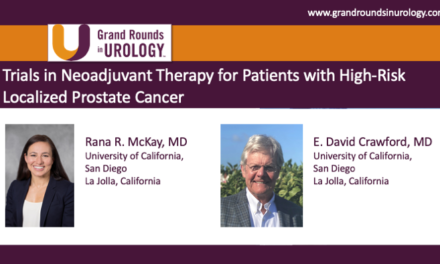Scott B. Sellinger, MD, presented “Burning Questions and Controversies in the Management of Advanced Prostate Cancer Patients” during the 32nd Annual International Prostate Cancer Update (IPCU32) conference on March 8, 2022, in Snowbird, Utah.
How to cite: Sellinger, Scott B. “Burning Questions and Controversies in the Management of Advanced Prostate Cancer Patients.” March 8, 2022. Accessed Dec 2025. https://grandroundsinurology.com/burning-questions-and-controversies-in-the-management-of-advanced-prostate-cancer-patients/
Burning Questions and Controversies in the Management of Advanced Prostate Cancer Patients – Summary
Scott B. Sellinger, MD, President of Advanced Urology Institute and a Partner at Southeastern Urological Center in Tallahassee, Florida, breaks down treatment groups for advanced prostate cancer and details therapeutic options for each. He defines non-metastatic castration-sensitive (nmCSPC), metastatic castration-sensitive (mCSPC), non-metastatic castration-resistant (nmCRPC), and metastatic castration-resistant prostate cancer (mCRPC). Noting that each group requires a different treatment strategy, Dr. Sellinger breaks down the treatment options for each. Selection of additional treatments beyond ADT is important for treating prostate cancer, and he reviews the trials for the androgen receptor inhibitors, including enzalutamide, apalutamide, and darolutamide. Next, Dr. Sellinger reviews the FDA approvals and treatment strategy timeline of abiraterone, apalutamide, and enzalutamide. He details a study comparing the clinical efficacy and safety of abiraterone and enzalutamide in metastatic castration resistant prostate cancer, concluding that enzalutamide was more efficacious than abiraterone, but had higher side effects. Next, he discusses the best time to move away from first line androgen pathway inhibitors, and when to switch to another androgen pathway inhibitor or move to a new treatment entirely. He discusses a study in British Columbia on mCRPC patients which found that enzalutamide showed activity as a second line androgen pathway inhibitor. He notes that the CARD trial found that metastatic prostate cancer patients switching from an androgen pathway inhibitor to cabazitaxel was better than abiraterone or enzalutamide. Last, he reviews PARP inhibitors, enzymes which help repair single strand breaks in DNA, for use in advanced prostate cancer. Dr. Sellinger concludes that germline and somatic testing are important prior to choosing a treatment, and that urologists should consider PARP inhibitors for any patient who meets the criteria for olaparib or rucaparib.
About the 32nd Annual International Prostate Cancer Update (IPCU32):
Presented by Program Chair E. David Crawford, MD, The International Prostate Cancer Update (IPCU), is a multi-day, CME-accredited conference focused on new developments in prostate cancer treatment, diagnosis, and prevention. IPCU 32 featured lectures, interactive discussions, panel roundtables, debates, and case reports. This conference was led by expert physicians and is designed for urologists, medical oncologists, radiation oncologists, and other healthcare professionals involved in the diagnosis and treatment of prostate cancer.
ABOUT THE AUTHOR
Scott B. Sellinger, MD, FACS, is president of Advanced Urology Institute in Tallahassee, Florida. He has been a partner at Southeastern Urological Center, now a division of Advanced Urology Institute, since 1991. Dr. Sellinger earned his medical degree from the University of Florida in Gainesville, prior to which he received his BS degree in chemistry from Syracuse University in New York. He completed his urology residency at the University of Florida and has lived in Tallahassee for over 32 years.
Dr. Sellinger was president of the Capital Medical Society in 2003 and served as president of the Florida Urological Society in 2005. In 2018, Dr. Sellinger served as president of the Southeastern Section of the American Urological Association (SESAUA). In 2019, he served as president of the American Association of Clinical Urologists (AACU). In addition to his urology specific work, Dr. Sellinger has developed a special interest in risk management and prevention of medical errors and has lectured extensively on this subject. He is also interested in large group practice development and management. For several years, Dr. Sellinger has served on the board of Advanced Urology Institute (AUI) representing his care center in Tallahassee. In January 2021, he became the second president of AUI, now one of the largest independent urology practices in the United States. Dr. Sellinger currently chairs the Advanced Prostate Cancer (APC) committee and oversees seven APC clinics within AUI. Since 2015, he has also served on the Large Urology Group Practice Association (LUGPA) Board of Directors, where he currently serves as President-Elect. At LUGPA, he is proud to represent over 2300 urologists by working to preserve and advance the independent practice of urology.




